Unit4 I used to be afrad of the dark SectionB 1a-1e课件
文档属性
| 名称 | Unit4 I used to be afrad of the dark SectionB 1a-1e课件 |
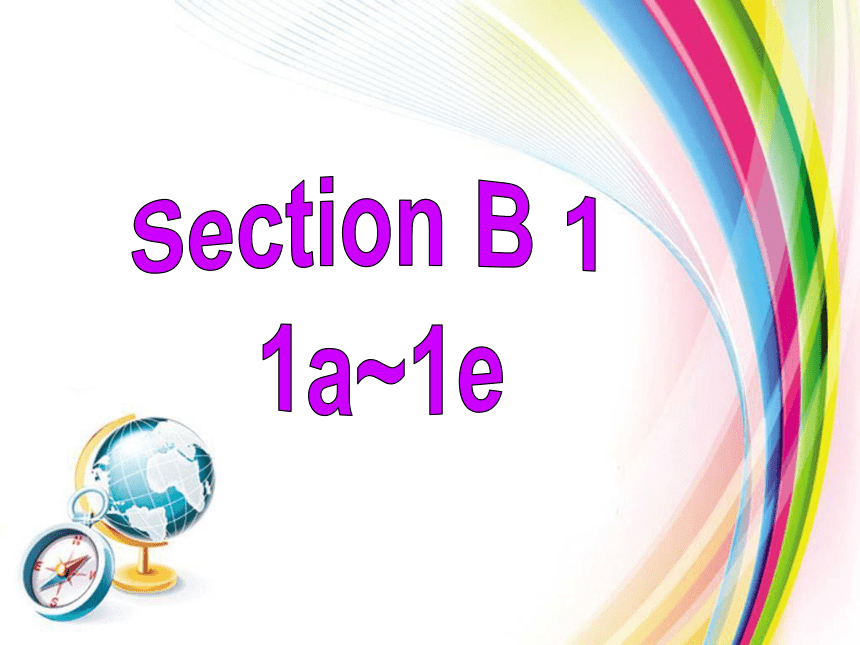
|
|
| 格式 | zip | ||
| 文件大小 | 2.4MB | ||
| 资源类型 | 教案 | ||
| 版本资源 | 人教新目标(Go for it)版 | ||
| 科目 | 英语 | ||
| 更新时间 | 2018-07-08 00:00:00 | ||
图片预览

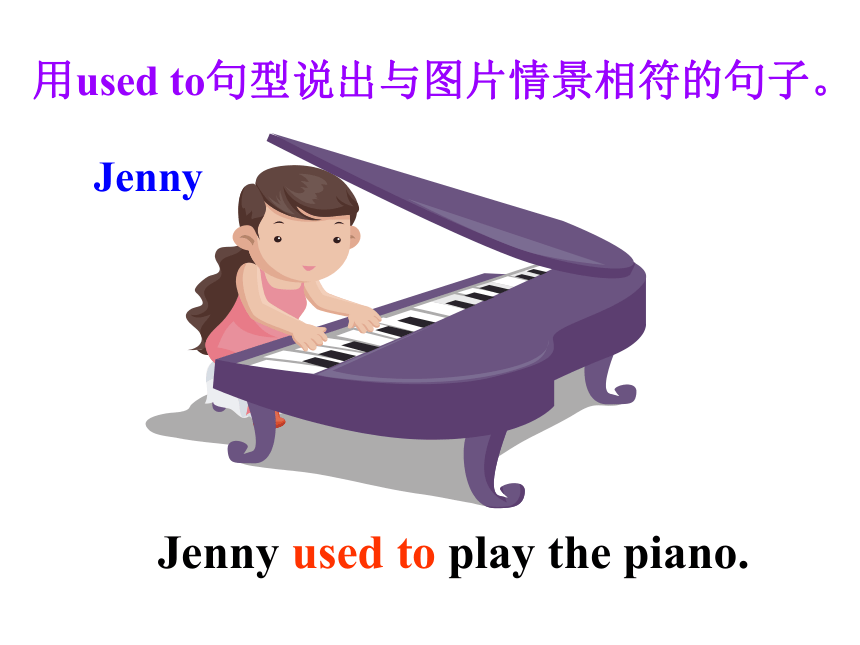
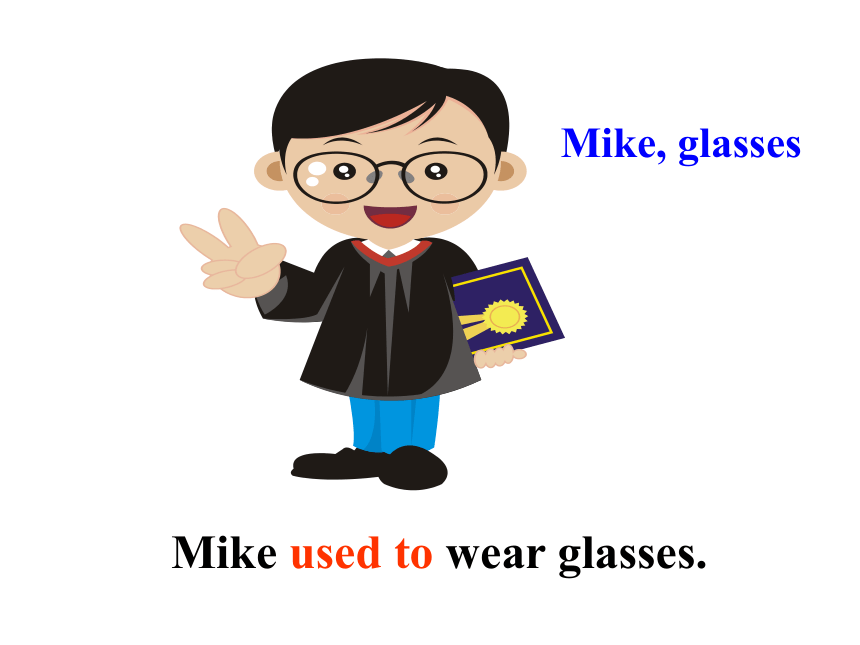
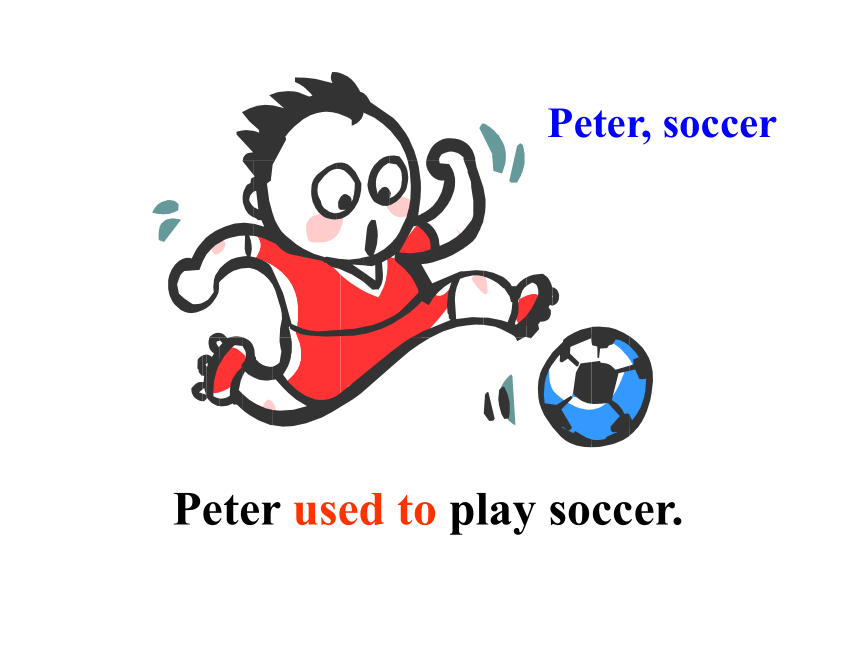
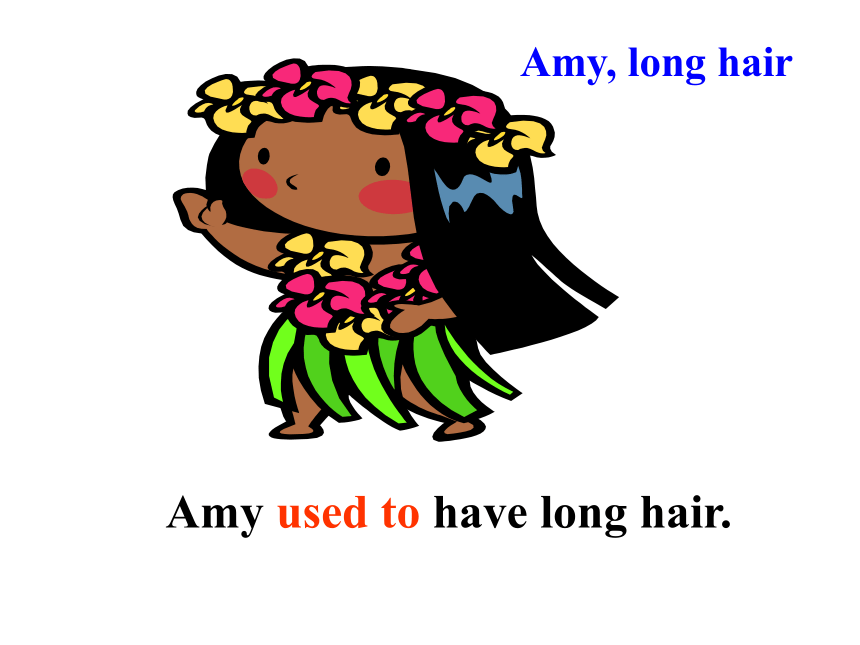
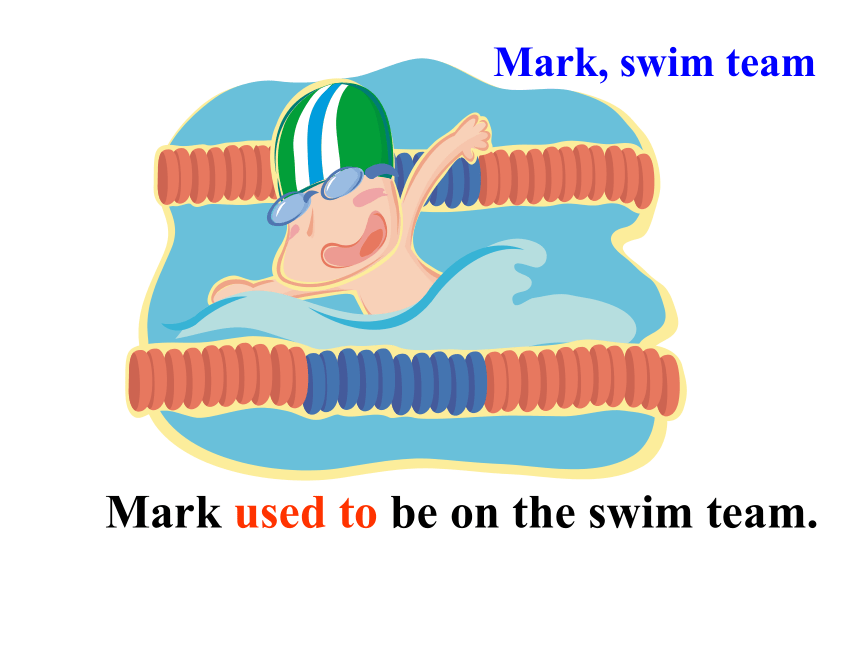
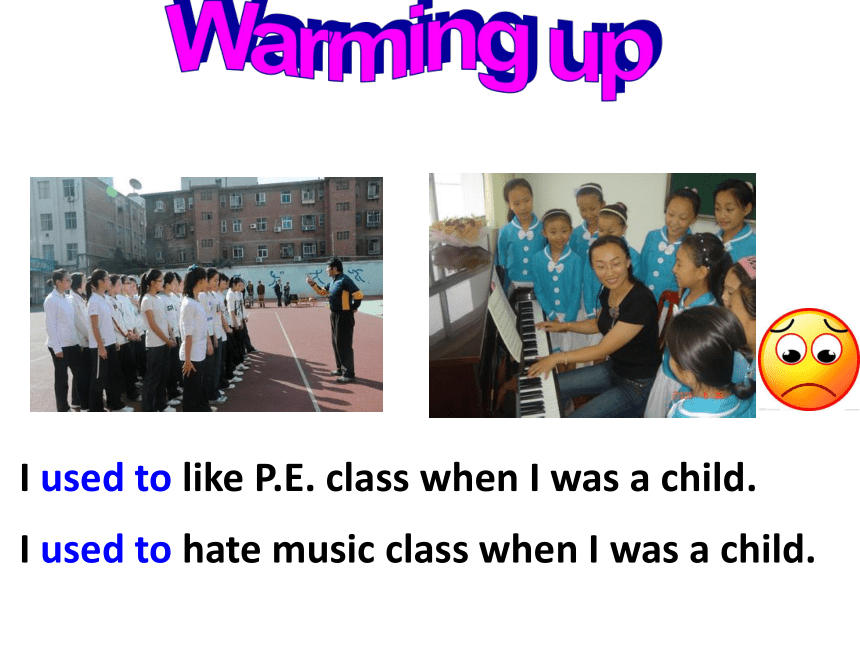
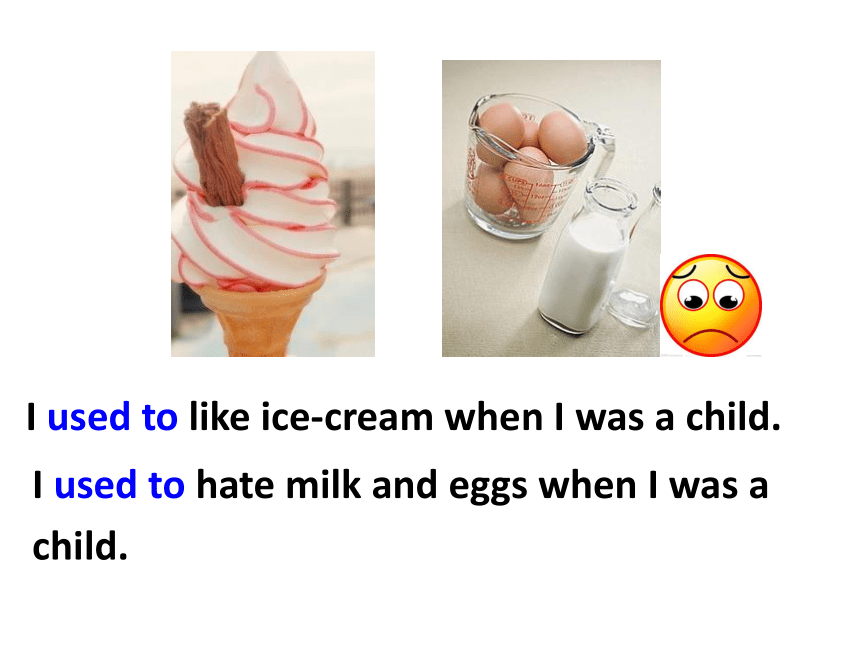
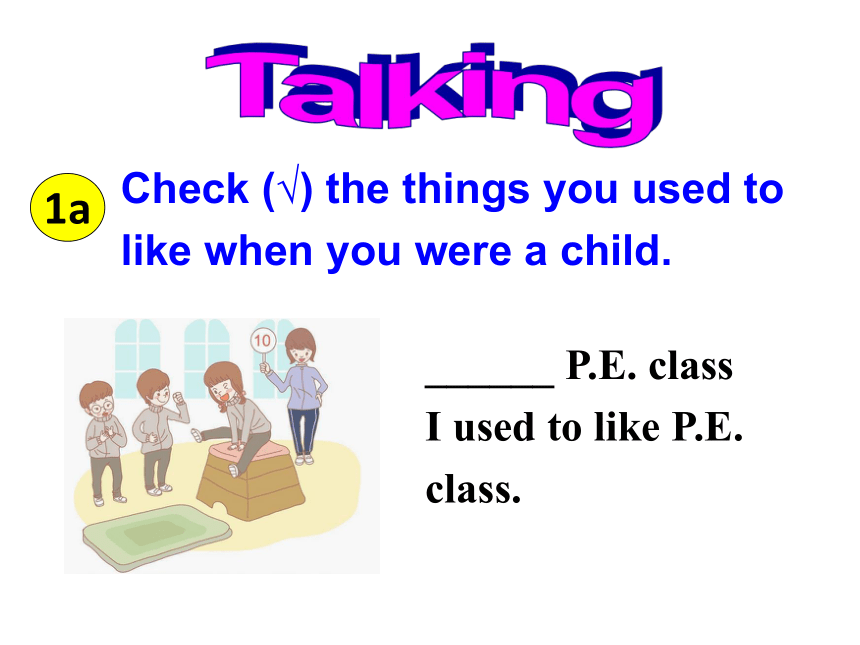
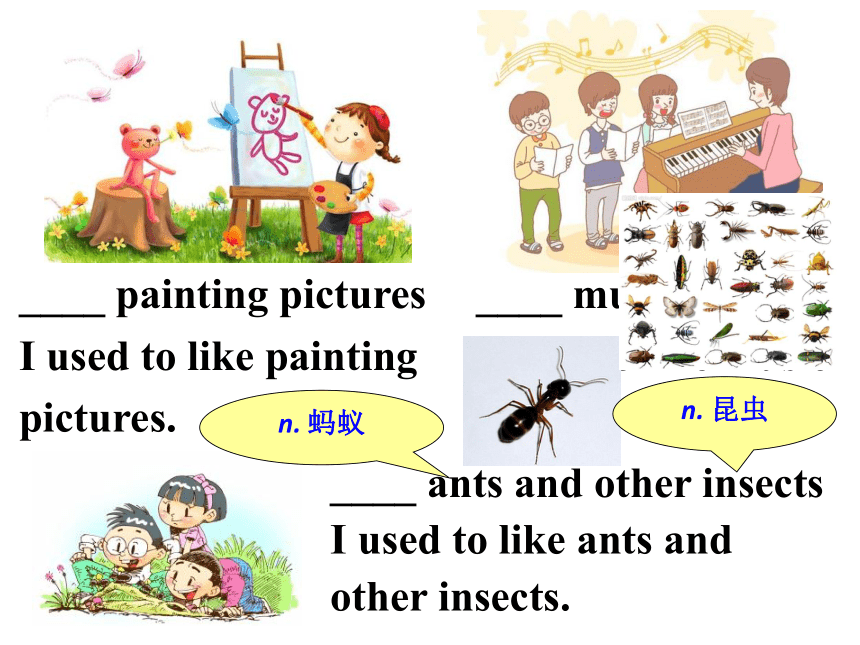
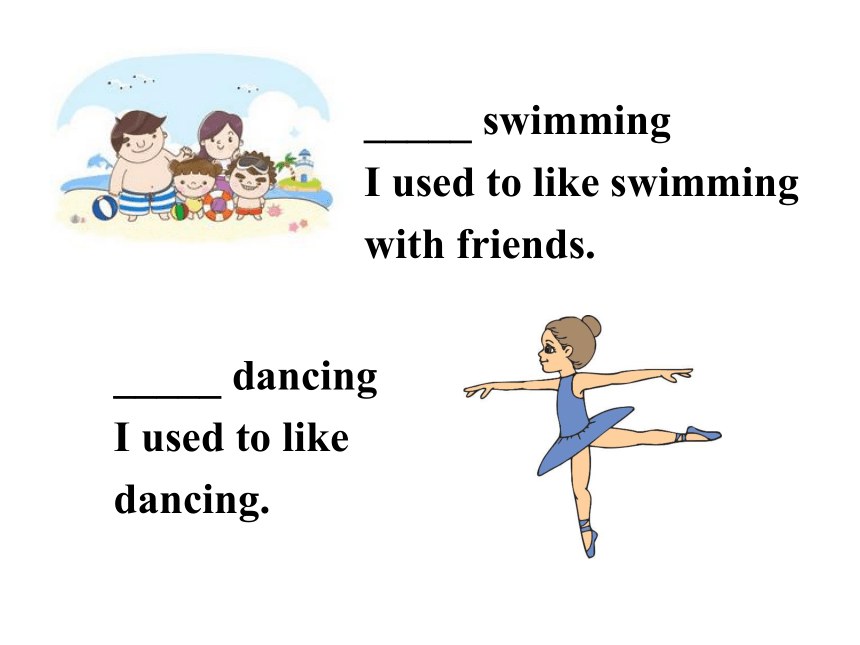
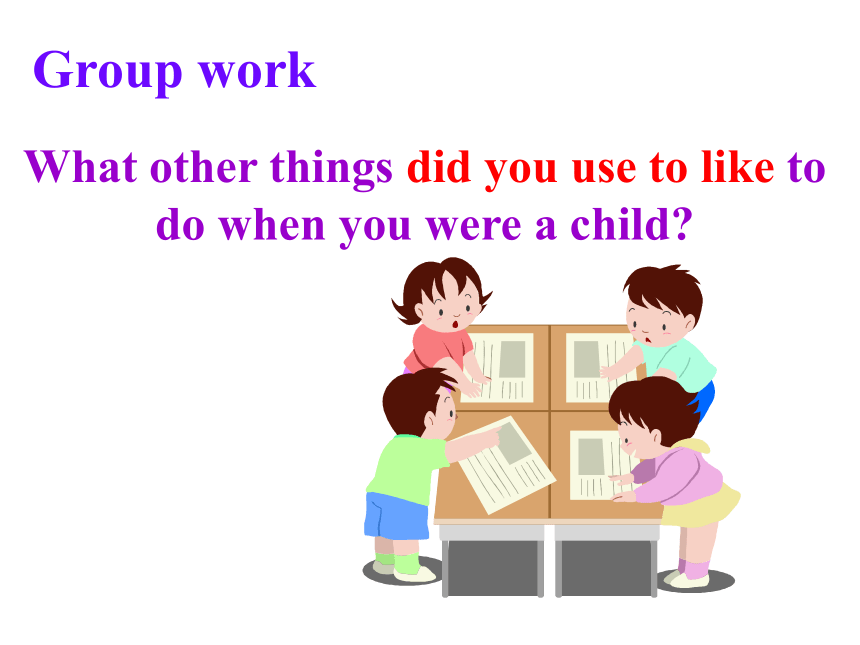
文档简介
课件62张PPT。Section B 1
1a~1e Jenny used to play the piano. 用used to句型说出与图片情景相符的句子。Jenny Mike used to wear glasses. Mike, glasses Peter used to play soccer. Peter, soccer Amy, long hairAmy used to have long hair. Mark used to be on the swim team. Mark, swim team I used to like P.E. class when I was a child. Warming upI used to hate music class when I was a child.I used to like ice-cream when I was a child.I used to hate milk and eggs when I was a child.TalkingCheck (√) the things you used to like when you were a child.1a______ P.E. class
I used to like P.E. class.____ painting pictures
I used to like painting pictures.____ music class
I used to like music class.____ ants and other insects
I used to like ants and other insects.n. 蚂蚁n. 昆虫_____ swimming
I used to like swimming with friends. _____ dancing
I used to like dancing.What other things did you use to like to do when you were a child? Group workA: What did you use to like to do when you were a child?
B: I used to like… what about you? Did you use to like ···?A: Do you have a colorful childhood?
B: Yes/No,…read comicsplay with dollsplay with balloonsplay pijin(皮筋)play with toy carschat with my parentsplay with the insectsplay aloneA: Yes/No,···Listen and check (√) the sentences you hear.1. ____ I didn’t use to like tests.
2. ____ We used to walk to school.
3. ____ I used to hate P.E. class.
4. ____ I used to be on the soccer team.1c√Listening√1d. Listen again. What do the girl and the boy say about things in the past and now? Fill in the chart. testsP.E. testsclass the school uniformwhatever we likejust studyloveplayTalkingCompare yourself with your partner.1eI used to be nervous about tests all the time. What about you?Yes, me too. And I used to be afraid of making a speech in public.I used to hate P. E. class. What about you?Well, I used to walk to school. I used to ride my bike to school. What about you?I used to hate
P. E. class. But now I love it.be nervous about
意为“对…..感到紧张”,about 为介词,后接名
词、代词或动词的-ing形式作宾语。
? There is nothing to be nervous about.
没什么可紧张的。
? I’ll be nervous about speaking in your
presence. 有你在场我说话就紧张了。 Language points Important phrases画画
步行去上学
在足球队
穿校服
一直,总是
担心
painting pictures
walk to school
on the soccer team
wear school uniform
all the time
worry about
Unit 4 I used to be afraid of the dark.Section B 2a-2eStay-at-home childrenDo you know “stay-at-home children” ?
What do you think of them?left-behind childrenmove to the city
to look for jobsseldom come back homehardly everThey miss their parents.
They feellonelyunhappy TitleMaybe It meansHe used to study hard , and now he ______
_____.orHe _________ _____ _____ study hard, but now
he _______ __________.studiesstudiesharder
didn’tuse tohardHe Studies Harder Than He Used toLi Wen2bRead the passage and put the sentences [A-D] in the correct places.A. They had a long talk
B. Now Li Wen has really changed
C. However, things began to change a
few years ago
D. His teacher was worried about himPara. 1 _____ 由上文“当他小时候,他很少惹麻烦,他的家人和他在一起生活”,以及下文“他的父母搬到城市里去找工作,他很想念他们而且觉得很孤独和不开心”,可知李文的生活发生的变化,故应选C。点拨CPara. 2 _____ 点拨由上文“他告诉老师说他想离开学校”,以及下文“老师给他的父母亲打电话,并建议他们亲自和李文谈一谈”,可推测老师对李文的情况很担心,故应选D。DPara. 3 _____ 点拨由上一段可知,李文的父母长途跋涉到达李文所在学校。再由空格后的李文所说的话语“这正是我所需要的”,可推测知李文父母亲应是和他进行了一次促膝长谈,故应选A。APara. 4 _____ 点拨读本段可知,李文的父母在那次谈话后,更加关注他们的儿子。再由空格后面的句子都是描述李文所发生的变化的句子,“更加外向”、“参加了学校篮球队”“比以前更加努力学习”等等。可见空格处句子的意思是“现在李文真得变了”。B2cRead the passage again and underline the problems that Li Wen used to have. 1. He became less interested in studying.
2. Sometimes he was absent from classes, and he failed his examinations.
3. Li Wen was shy and was not able to make friends quickly in school.Use the clues from the passage to help you guess the meaning of the words in the box. 2d1. influence 对比李文的父母外出找工作前后李文的行为和思想表现;再由下文“他变得对学习不感兴趣、逃课、考试不及格”等情况的出现,可知是李文不高兴的情绪“影响”了他的学业。故influence一词应意为“影响”。2. absent由上下文“他对学习不再感兴趣”、 “他考试不及格”,以及关键词classes,可以推测 “他经常缺课”,可知absent意为“缺席,不再”。3. boarding school由上文“ …he was absent from classes and failed his examinations和Li Wen’s parents made the decision”可知其父母送其去了一所寄宿制学校。4. in person由下文“His parents took a 24-hour train and a 5-hour bus ride to get to Li Wen’s school.”,可知其父母费如此大的周折赶回家来,就是因老师的建议“亲自和他们的儿子进行交谈” ,故可推测in person意为“亲自地”。be proud of / take pride in
make a decision/ decide
miss / be absent from
change / influence
look after / take care of Complete the passage with the proper forms of the words and phrases in the box. 2eLi Wen is a 15-year-old boy. He works hard and does well in school. It is hard to believe that he used to have difficulties in school. When his parents moved to the city to work, they could not be at home to _____________________him. So he became less interested in studying and _____________________ classes. missed/ was absent fromlook after/ take care of Then his parents ____________________ to send him to a boarding school. He found life there difficult. One day he told his teacher he wanted to leave the school. His teacher advised his parents to talk with their son in person. This conversation __________________ his life. changed/ influencedmade a decision/decided He realized that his parents would always love him, and they would ______________________ everything good that he did. Now he is much happier and more outgoing than he used to be. be proud of/ take pride inIt is hard to believe that he used to have difficulties in school.
(l) It is hard to believe that …是一个含有宾
语从句的复合句。主句中it作形式主语,真
正的主语是that引导的从句。
? It is hard to believe that they finished so
much work during such a short time.
在这么短的一段时间内他们完成了如此多
的工作, 这令人难以相信。When he was a little boy, he seldom caused
any problems, and his family spent a lot of
time together.
seldom 作副词,意为“不常;很少”相当
于hardly ever, 其反义词为often(经常)通常
置于实义动词之前,助动词、系动词或情态动
词之后。
? She seldom goes out by herself.
她很少独自外出。
? He is seldom late for school.
他上学很少迟到。注意:1) seldom 具有否定意义,用于句首表示强
调时,主谓要部分倒装
? Seldom do I go shopping by tax, unless it’s
raining.
除非下雨,我很少打车去购物。
2) seldom 用于反意疑问句时,附加问句不
用否定词not。
? They seldom come late, do they?
他们很少迟到,对吗?中考链接
—Do you like seeing a movie on your mobile phone?
—No. I ______ do that because it makes me uncomfortable.
A. seldom?? B. often
C. usually?? ? D. sometimesA . …his grandparents came to take care of to him. take care of是一个动词短语,意为“照顾;照管”,意同look after 。 e.g. My parents are not at home and I have to look after/ take care of my sister.
我的父母不在家,我不得不照顾我的小妹妹。 Li Wen’s unhappiness began to influence his schoolwork.influence v. & n. 影响
influence可用作动词,其后接名词或 动词不定式的复合结构。
influence可用作名词,常用于have / has an influence on ...或be an influence on ...结构。 e.g. Lu Xun’s works have strongly influenced millions of people.
鲁迅的小说影响了数以万计的人。
What influenced Mike to make that decision?
什么影响了迈克,让他做出了那个决定?Cellphones have an important influence on our life.
手机对我们的生活影响很大。
Their mother is a good influence on their habits.
他们的母亲对他们的习惯有好的影响。请根据汉语意思完成下列英语句子。
1. 老师对学生有很大的影响。
Teachers __________ a great _____________?students.
2. 受父母的影响,李梅成为了一名医生。
Li Mei’s parents __________ her ________ a doctor.have / areinfluence oninfluencedto be?3. 他的成功影响了其他的工人。
His success _______________________.
4. 谁对你的人生有重大影响?
Who ____________________________ on your life?influenced other workers? has / is an important influenceHe was absent from classes and failed his
examinations. 他翘课,并且考试不及格。
(l) be absent from …意为“缺席.....此处用作形容词,意为“缺席;不在”。
? A good student would not be absent from
school. 好学生是不会逃课的
拓展:absent 用作动词, 意为“缺席;不参加”。
? He absent himself from the meeting
yesterday. 他昨天没有出席会议。fail v. 失败;未能(做到);不及格1) fail作 “失败;未能(做到)” 讲时:
e.g. Many diets fail because they’re boring.
许多节食失败了,因为太枯燥了。
fail in sth. 表示“在某方面失败”。
e.g. I failed in everything I tried.
我所有的尝试都失败了。fail to do sth.表示“未能做到某事”。
e.g. She failed to get into art college.
她没能赶上美术课。
fail意为“不及格”时,既可作及物动词,也可作不及物动词。
e.g. He failed (in) the exam.
他考试不及格。根据句意,选择正确选项完成句子。
(1) Their car failed ______ the high mountain.
A. to climb??? ???? B. climbing
(2) I don’t know why she failed ______ the driving test.
A. on ? ? ? ? ? ? ? ? ?B. inA?B? 5. Li Wen’s parents made a decision to
send him to a boarding school.make a decision 作决定e.g. It’s difficult to make a decision.
作一个决定是很难的。 She advised them to talk with their son in person.
班主任建议李文的父母亲自和她们的儿子谈谈。
(1)advise 用作及物动词,其宾语可以是名词、代词、动词-ing 形式,也可以是that从句。advise也可以接双宾语,其直接宾语可由名词、带疑问词的动词不定式或that/wh-从句充当。advise还可由动词不定式充当宾补的复合宾语。advise的常用句型:1)advise doing sth. 意为“建议做某事”
? He advised leaving early.
2) advise sb. to do sth.意为“建议某人做某事”
? The doctor advised me to take a complete
rest. 医生建议我彻底休息一下。
注意:advise后不能直接跟不定式作宾语。
3) advise sb. against doing sth. 意为“劝告某
人不要做某事”,有时可与 advise sb. not to do sth.互换。? He advised her against going out at night.
=He advised her not to no out at night.
他劝她晚上不要出去。
4) advise sb. of sth.意为“通知或告知某人有
某情况”。
? Please advise us oj the arrival of the goods.
货物到达时请通知我们。
(2) in person意为“亲身;亲自”。
? You should come here in person tomorrow.
明天你应该亲自来这儿。e.g. Please tell me exactly what he said.
请将他说的话准确地告诉我。 exactly adv. 确切地;精确地“It was exactly what I needed,”…e.g. Please tell me exactly what he said.
请将他说的话准确地告诉我。 exactly adv. 确切地;精确地“It was exactly what I needed,”…“…, they are always thinking of me. They take
pride in everything good that I do.”
他们一直牵挂我,并为我所做的每一件好事感
到自豪。
(l) be always doing sth.意为“总是做某事,
一直做某事”,always常用在一般现在时态里,
表示经常的行为习惯。当与进行时连用,构
成句型“be always doing sth.”时,常表达说话
人的某种情绪,如赞扬、不满、责 备等。? He always asking his parents for money.
他总是向他的父母要钱。
? She is always thinking of her work.
她总是想着自己的工作。
( 2 ) take pride in “为…感到自豪/骄傲“,与
be proud of 同义。后接让人引以为荣的对象,
其中pride为抽象名词,意为 “自豪;骄傲”,
in 为介词,后接名词、代词或动名词作宾语。
? The young mother took pride in her son.=
The young mother was proud of her son.
这个年轻的妈妈为她的儿子感到自豪。根据句意选用恰当的选项填空。
1. I’m ________ (pride / proud) to be your friend.
2. He wore his medals with _______ (pride / proud).
3. I’m proud ____ (of / on) my hometown.
4. He loved his daughter and took pride _____ (of / in) her.proud?pride?of??in??
1a~1e Jenny used to play the piano. 用used to句型说出与图片情景相符的句子。Jenny Mike used to wear glasses. Mike, glasses Peter used to play soccer. Peter, soccer Amy, long hairAmy used to have long hair. Mark used to be on the swim team. Mark, swim team I used to like P.E. class when I was a child. Warming upI used to hate music class when I was a child.I used to like ice-cream when I was a child.I used to hate milk and eggs when I was a child.TalkingCheck (√) the things you used to like when you were a child.1a______ P.E. class
I used to like P.E. class.____ painting pictures
I used to like painting pictures.____ music class
I used to like music class.____ ants and other insects
I used to like ants and other insects.n. 蚂蚁n. 昆虫_____ swimming
I used to like swimming with friends. _____ dancing
I used to like dancing.What other things did you use to like to do when you were a child? Group workA: What did you use to like to do when you were a child?
B: I used to like… what about you? Did you use to like ···?A: Do you have a colorful childhood?
B: Yes/No,…read comicsplay with dollsplay with balloonsplay pijin(皮筋)play with toy carschat with my parentsplay with the insectsplay aloneA: Yes/No,···Listen and check (√) the sentences you hear.1. ____ I didn’t use to like tests.
2. ____ We used to walk to school.
3. ____ I used to hate P.E. class.
4. ____ I used to be on the soccer team.1c√Listening√1d. Listen again. What do the girl and the boy say about things in the past and now? Fill in the chart. testsP.E. testsclass the school uniformwhatever we likejust studyloveplayTalkingCompare yourself with your partner.1eI used to be nervous about tests all the time. What about you?Yes, me too. And I used to be afraid of making a speech in public.I used to hate P. E. class. What about you?Well, I used to walk to school. I used to ride my bike to school. What about you?I used to hate
P. E. class. But now I love it.be nervous about
意为“对…..感到紧张”,about 为介词,后接名
词、代词或动词的-ing形式作宾语。
? There is nothing to be nervous about.
没什么可紧张的。
? I’ll be nervous about speaking in your
presence. 有你在场我说话就紧张了。 Language points Important phrases画画
步行去上学
在足球队
穿校服
一直,总是
担心
painting pictures
walk to school
on the soccer team
wear school uniform
all the time
worry about
Unit 4 I used to be afraid of the dark.Section B 2a-2eStay-at-home childrenDo you know “stay-at-home children” ?
What do you think of them?left-behind childrenmove to the city
to look for jobsseldom come back homehardly everThey miss their parents.
They feellonelyunhappy TitleMaybe It meansHe used to study hard , and now he ______
_____.orHe _________ _____ _____ study hard, but now
he _______ __________.studiesstudiesharder
didn’tuse tohardHe Studies Harder Than He Used toLi Wen2bRead the passage and put the sentences [A-D] in the correct places.A. They had a long talk
B. Now Li Wen has really changed
C. However, things began to change a
few years ago
D. His teacher was worried about himPara. 1 _____ 由上文“当他小时候,他很少惹麻烦,他的家人和他在一起生活”,以及下文“他的父母搬到城市里去找工作,他很想念他们而且觉得很孤独和不开心”,可知李文的生活发生的变化,故应选C。点拨CPara. 2 _____ 点拨由上文“他告诉老师说他想离开学校”,以及下文“老师给他的父母亲打电话,并建议他们亲自和李文谈一谈”,可推测老师对李文的情况很担心,故应选D。DPara. 3 _____ 点拨由上一段可知,李文的父母长途跋涉到达李文所在学校。再由空格后的李文所说的话语“这正是我所需要的”,可推测知李文父母亲应是和他进行了一次促膝长谈,故应选A。APara. 4 _____ 点拨读本段可知,李文的父母在那次谈话后,更加关注他们的儿子。再由空格后面的句子都是描述李文所发生的变化的句子,“更加外向”、“参加了学校篮球队”“比以前更加努力学习”等等。可见空格处句子的意思是“现在李文真得变了”。B2cRead the passage again and underline the problems that Li Wen used to have. 1. He became less interested in studying.
2. Sometimes he was absent from classes, and he failed his examinations.
3. Li Wen was shy and was not able to make friends quickly in school.Use the clues from the passage to help you guess the meaning of the words in the box. 2d1. influence 对比李文的父母外出找工作前后李文的行为和思想表现;再由下文“他变得对学习不感兴趣、逃课、考试不及格”等情况的出现,可知是李文不高兴的情绪“影响”了他的学业。故influence一词应意为“影响”。2. absent由上下文“他对学习不再感兴趣”、 “他考试不及格”,以及关键词classes,可以推测 “他经常缺课”,可知absent意为“缺席,不再”。3. boarding school由上文“ …he was absent from classes and failed his examinations和Li Wen’s parents made the decision”可知其父母送其去了一所寄宿制学校。4. in person由下文“His parents took a 24-hour train and a 5-hour bus ride to get to Li Wen’s school.”,可知其父母费如此大的周折赶回家来,就是因老师的建议“亲自和他们的儿子进行交谈” ,故可推测in person意为“亲自地”。be proud of / take pride in
make a decision/ decide
miss / be absent from
change / influence
look after / take care of Complete the passage with the proper forms of the words and phrases in the box. 2eLi Wen is a 15-year-old boy. He works hard and does well in school. It is hard to believe that he used to have difficulties in school. When his parents moved to the city to work, they could not be at home to _____________________him. So he became less interested in studying and _____________________ classes. missed/ was absent fromlook after/ take care of Then his parents ____________________ to send him to a boarding school. He found life there difficult. One day he told his teacher he wanted to leave the school. His teacher advised his parents to talk with their son in person. This conversation __________________ his life. changed/ influencedmade a decision/decided He realized that his parents would always love him, and they would ______________________ everything good that he did. Now he is much happier and more outgoing than he used to be. be proud of/ take pride inIt is hard to believe that he used to have difficulties in school.
(l) It is hard to believe that …是一个含有宾
语从句的复合句。主句中it作形式主语,真
正的主语是that引导的从句。
? It is hard to believe that they finished so
much work during such a short time.
在这么短的一段时间内他们完成了如此多
的工作, 这令人难以相信。When he was a little boy, he seldom caused
any problems, and his family spent a lot of
time together.
seldom 作副词,意为“不常;很少”相当
于hardly ever, 其反义词为often(经常)通常
置于实义动词之前,助动词、系动词或情态动
词之后。
? She seldom goes out by herself.
她很少独自外出。
? He is seldom late for school.
他上学很少迟到。注意:1) seldom 具有否定意义,用于句首表示强
调时,主谓要部分倒装
? Seldom do I go shopping by tax, unless it’s
raining.
除非下雨,我很少打车去购物。
2) seldom 用于反意疑问句时,附加问句不
用否定词not。
? They seldom come late, do they?
他们很少迟到,对吗?中考链接
—Do you like seeing a movie on your mobile phone?
—No. I ______ do that because it makes me uncomfortable.
A. seldom?? B. often
C. usually?? ? D. sometimesA . …his grandparents came to take care of to him. take care of是一个动词短语,意为“照顾;照管”,意同look after 。 e.g. My parents are not at home and I have to look after/ take care of my sister.
我的父母不在家,我不得不照顾我的小妹妹。 Li Wen’s unhappiness began to influence his schoolwork.influence v. & n. 影响
influence可用作动词,其后接名词或 动词不定式的复合结构。
influence可用作名词,常用于have / has an influence on ...或be an influence on ...结构。 e.g. Lu Xun’s works have strongly influenced millions of people.
鲁迅的小说影响了数以万计的人。
What influenced Mike to make that decision?
什么影响了迈克,让他做出了那个决定?Cellphones have an important influence on our life.
手机对我们的生活影响很大。
Their mother is a good influence on their habits.
他们的母亲对他们的习惯有好的影响。请根据汉语意思完成下列英语句子。
1. 老师对学生有很大的影响。
Teachers __________ a great _____________?students.
2. 受父母的影响,李梅成为了一名医生。
Li Mei’s parents __________ her ________ a doctor.have / areinfluence oninfluencedto be?3. 他的成功影响了其他的工人。
His success _______________________.
4. 谁对你的人生有重大影响?
Who ____________________________ on your life?influenced other workers? has / is an important influenceHe was absent from classes and failed his
examinations. 他翘课,并且考试不及格。
(l) be absent from …意为“缺席.....此处用作形容词,意为“缺席;不在”。
? A good student would not be absent from
school. 好学生是不会逃课的
拓展:absent 用作动词, 意为“缺席;不参加”。
? He absent himself from the meeting
yesterday. 他昨天没有出席会议。fail v. 失败;未能(做到);不及格1) fail作 “失败;未能(做到)” 讲时:
e.g. Many diets fail because they’re boring.
许多节食失败了,因为太枯燥了。
fail in sth. 表示“在某方面失败”。
e.g. I failed in everything I tried.
我所有的尝试都失败了。fail to do sth.表示“未能做到某事”。
e.g. She failed to get into art college.
她没能赶上美术课。
fail意为“不及格”时,既可作及物动词,也可作不及物动词。
e.g. He failed (in) the exam.
他考试不及格。根据句意,选择正确选项完成句子。
(1) Their car failed ______ the high mountain.
A. to climb??? ???? B. climbing
(2) I don’t know why she failed ______ the driving test.
A. on ? ? ? ? ? ? ? ? ?B. inA?B? 5. Li Wen’s parents made a decision to
send him to a boarding school.make a decision 作决定e.g. It’s difficult to make a decision.
作一个决定是很难的。 She advised them to talk with their son in person.
班主任建议李文的父母亲自和她们的儿子谈谈。
(1)advise 用作及物动词,其宾语可以是名词、代词、动词-ing 形式,也可以是that从句。advise也可以接双宾语,其直接宾语可由名词、带疑问词的动词不定式或that/wh-从句充当。advise还可由动词不定式充当宾补的复合宾语。advise的常用句型:1)advise doing sth. 意为“建议做某事”
? He advised leaving early.
2) advise sb. to do sth.意为“建议某人做某事”
? The doctor advised me to take a complete
rest. 医生建议我彻底休息一下。
注意:advise后不能直接跟不定式作宾语。
3) advise sb. against doing sth. 意为“劝告某
人不要做某事”,有时可与 advise sb. not to do sth.互换。? He advised her against going out at night.
=He advised her not to no out at night.
他劝她晚上不要出去。
4) advise sb. of sth.意为“通知或告知某人有
某情况”。
? Please advise us oj the arrival of the goods.
货物到达时请通知我们。
(2) in person意为“亲身;亲自”。
? You should come here in person tomorrow.
明天你应该亲自来这儿。e.g. Please tell me exactly what he said.
请将他说的话准确地告诉我。 exactly adv. 确切地;精确地“It was exactly what I needed,”…e.g. Please tell me exactly what he said.
请将他说的话准确地告诉我。 exactly adv. 确切地;精确地“It was exactly what I needed,”…“…, they are always thinking of me. They take
pride in everything good that I do.”
他们一直牵挂我,并为我所做的每一件好事感
到自豪。
(l) be always doing sth.意为“总是做某事,
一直做某事”,always常用在一般现在时态里,
表示经常的行为习惯。当与进行时连用,构
成句型“be always doing sth.”时,常表达说话
人的某种情绪,如赞扬、不满、责 备等。? He always asking his parents for money.
他总是向他的父母要钱。
? She is always thinking of her work.
她总是想着自己的工作。
( 2 ) take pride in “为…感到自豪/骄傲“,与
be proud of 同义。后接让人引以为荣的对象,
其中pride为抽象名词,意为 “自豪;骄傲”,
in 为介词,后接名词、代词或动名词作宾语。
? The young mother took pride in her son.=
The young mother was proud of her son.
这个年轻的妈妈为她的儿子感到自豪。根据句意选用恰当的选项填空。
1. I’m ________ (pride / proud) to be your friend.
2. He wore his medals with _______ (pride / proud).
3. I’m proud ____ (of / on) my hometown.
4. He loved his daughter and took pride _____ (of / in) her.proud?pride?of??in??
同课章节目录
- Unit 1 How can we become good learners.
- Section A
- Section B
- Unit 2 I think that mooncakes are delicious!
- Section A
- Section B
- Unit 3 Could you please tell me where the restroom
- Section A
- Section B
- Unit 4 I used to be afraid of the dark.
- Section A
- Section B
- Unit 5 What are the shirts made of?
- Section A
- Section B
- Review of Units 1-5
- Unit 6 When was it invented?
- Section A
- Section B
- Unit 7 Teenagers should be allowed to choose their
- Section A
- Section B
- Unit 8 It must belong to Carla.
- Section A
- Section B
- Unit 9 I like music that I can dance to.
- Section A
- Section B
- Unit 10 You're supposed to shake hands.
- Section A
- Section B
- Review of Units 6-10
- Unit 11 Sad movies make me cry.
- Section A
- Section B
- Unit 12 Life is full of the unexpected
- Section A
- Section B
- Unit 13 We're trying to save the earth!
- Section A
- Section B
- Unit 14 I remember meeting all of you in Grade 7.
- Section A
- Section B
- Review of Units 11-14
